10 best independent coffee brands to please any aficionado
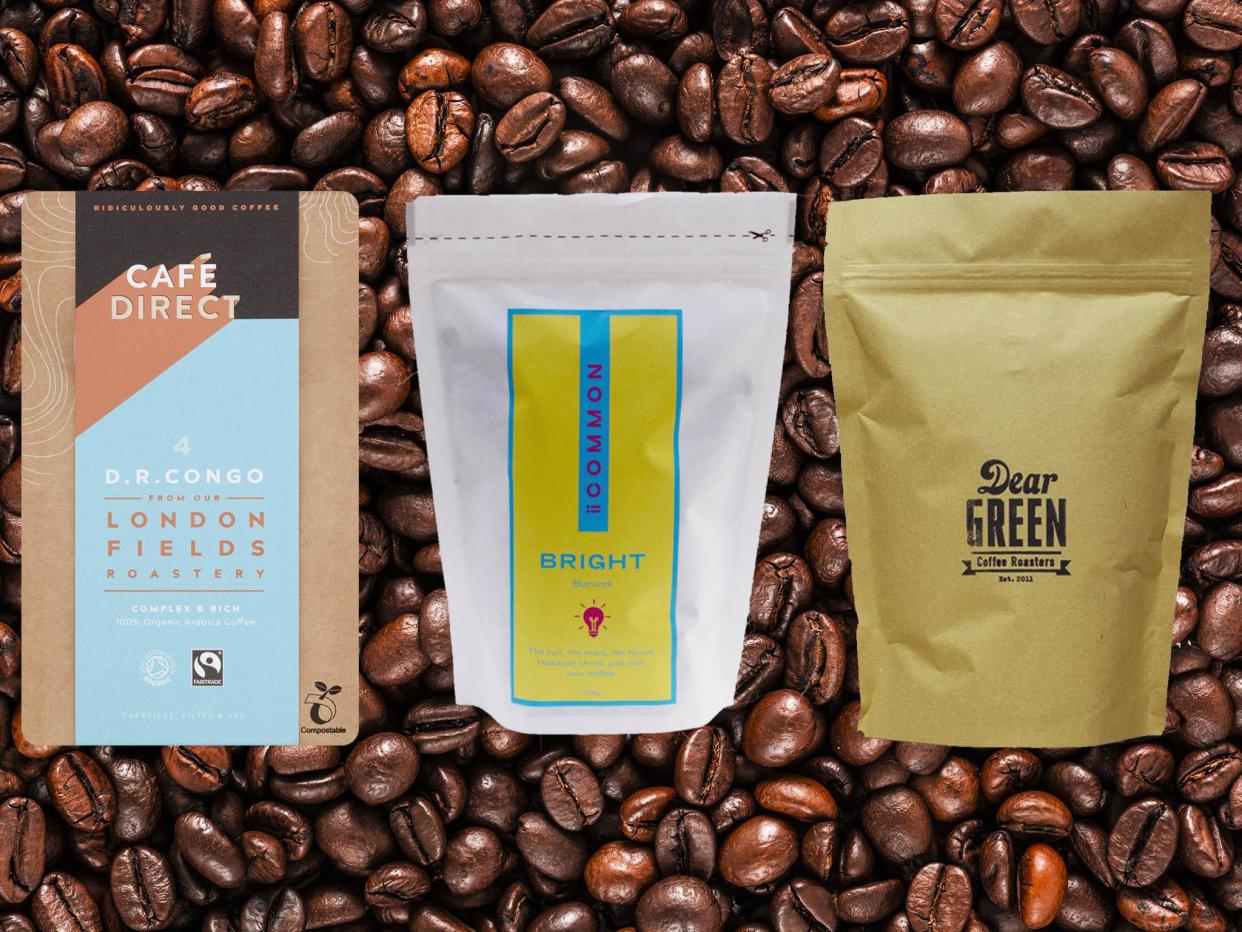
The independent coffee scene continues to boom, and with many of us conscious of the environmental impact of disposable cups we’re keener than ever to get in on the act at home.
Whether you brew with a barista-worthy coffee machine, cafetiere, stovetop or good old drip-filter, you can grab yourself a piece of the coffee shop action with some great coffee and do your bit for the farmers and the planet.
Independent, or “speciality” coffee differs from commercial coffee as it tends to be traceable and pays the farmer a fair price, while large brands sold in bulk may be driven by their bottom line leading to less favourable conditions for both the coffee and the growers.
Thomas Haigh, Head of Tate coffee and Certified Q Grader (the highest certification in coffee requiring 22 sensory exams) runs the Tate roastery and sources coffee worldwide.
“Better coffee comes through more direct trading; relationships between growers and roasters are key to sustainability and coffee is becoming increasingly more delicious as a result. But the industry is fragile: 80 per cent of the world’s production is grown by smallholders facing increasing challenges due to the climate crisis, migration, conflict and social inequity. Investing in these farmers’ coffee can contribute to the development and sustainability of these communities,” he says.
As Thomas mentions, these coffees are traceable, so more information ont the packaging helps you determine what kind of cup to expect. Look for 100 per cent arabica beans, but there are varietal differences, details of provenance, processing method and roast level which alter the experience.
Colombian coffee, for example, is often sweetly nutty, whereas Brazil’s sits the creamy, chocolatey end of the spectrum, but other factors can influence this.
“Some people prefer syrupy natural processed coffees while others go for cleaner, washed processed coffee but it’s important to discover which coffees are right for you. Roast level will also impact the flavour, so if you like a brighter coffee err towards a lighter roast. For sweeter, rounder coffees try medium,” Thomas suggests.
We tested 30 coffees to whittle down this shortlist and used different brewing methods over a month to see which made the grade. The final coffees were whole beans which we ground or ready-ground coffee. Each was brewed using filtered water, given the same brew time and coffee:water ratio and tasted as instructed by a Q Grader (skimmed for excess grounds then tasted black from a spoon using an aerated sip, like a wine). We were looking for fragrance, aroma, the taste profile and sustainability efforts from the brand.
Put the kettle on and read on for our pick of the top of the coffee crops…
You can trust our independent reviews. We may earn commission from some of the retailers, but we never allow this to influence selections, which are formed from real-world testing and expert advice. This revenue helps to fund journalism across The Independent.
Dear Green, Kenya tano ndogo ab: £10.75 for 250g, Dear Green
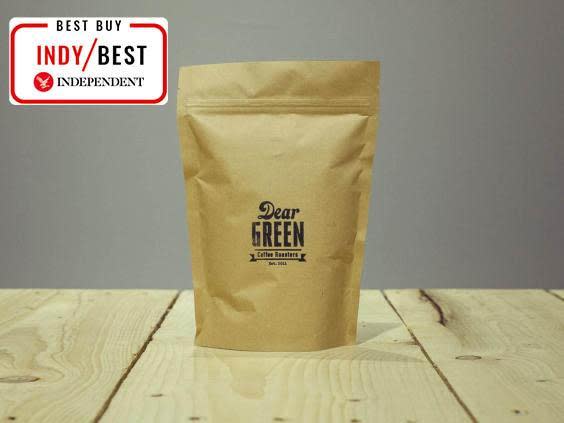
Dear Green – a roastery taking its name from its Glasgow home, The Dear Green Place, roasts and supplies speciality coffee alongside training baristas and coffee lovers alike in sensory and technical classes.
Ethical sourcing is a big focus, as is organic and Dear Green tries to visit every coffee farm to see that the beans are sourced fairly and sustainably with each smallholder. As with most truly ethical coffee brands, Dear Green pays over the odds for beans to encourage further sustainable agricultural methods and benefits for the coffee communities. Coffees are super seasonal and may only be on the site for a short while, so grab them while you can.
We tried the Kenyan Tano Ndogo coffee, from a newly formed group of farmers from Gitwe, Kenya which has been awarded a cup score of 88.50/100, so this is a special one. Dear Green says there are fruity notes of guava and clementine, and often with things like this it’s just about detectable, but this coffee has an incredibly forward flavour of both in the initial hit and then in the aftertaste. We loved it, but it’s so lively and zippy with oranges that it could be a divisive one for others.
Cafédirect, D. R. Congo ground coffee: £5.50 for 200g, Waitrose
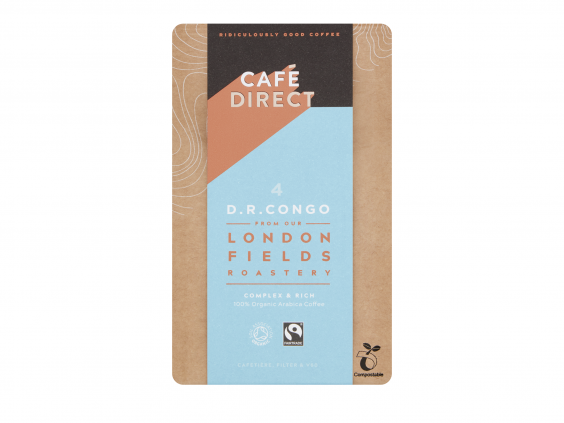
Cafédirect invests over half of its profits back into farming communities and pays a premium for beans in order to drive positive environmental and social change. This particular coffee is sourced from the Muungano co-operative, situated in Eastern D.R. Congo – an emerging coffee growing region. Muungano translates as togetherness in Swahili, as this cooperative unites farmers of various ethnicities that were previously divided by the civil war and seeks to address gender equality (they run workshops on gender justice and recently elected two female farmers onto the board).
This single origin arabica is a bourbon variety ( a sub variety of arabica), grown on lush volcanic soil which offers ideal conditions for growing sweet, bright, and complex coffee beans. The coffee is small-batch roasted in Cafédirect’s London Fields roastery and it boasts a full-on flavour with delicate acidity. We’d agree. We found it had a powerful heady aroma considering its light roast that went over to burnt butter, which they characterise as a honeycomb note. There is a very pleasant limey citrus finish which lifts this coffee to an elevated status. Pleasingly, its London Fields range is 100 per cent plastic free and packaged in kraft bags suitable for your home compost or food waste bin. Good news all round.
Pact, house coffee: £7.99 for 250g, Pact
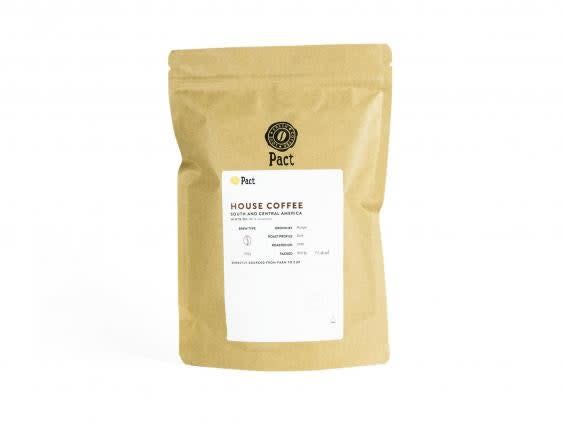
Pact offers subscription based or one-off purchases of coffee from a roster of beans that have been awarded an international Coffee Quality Score of 80 or above. Pact, like other good guys, invests fully in the direct trade model in an effort to be a positive force: going straight to the source of the beans, paying above the Fairtrade rate and supporting farmers with ongoing investments and training with the goal of improving local economies and benefitting communities.
This house coffee of mixed arabica from South and Central America, goes through rigorous standards of green coffee sorting and includes smaller beans than most buyers would usually pay for; meaning the farmer achieves a higher price for the yield. These beans are grouped, blended and roasted at the HQ in Bermondsey to achieve a consistently high flavour profile which Pact says is “toffee-like with rich cocoa and mild acidity”. On tasting, we were surprised this wasn’t an espresso-specific blend as there is a very intensely sweet chocolatey aroma that turns into a reassuring bitterness once on the palate. It would make a fabulous espresso regardless or we’re equally happy to drink it long and black.
Grind, house blend coffee and tin: £10 for 227g, Grind
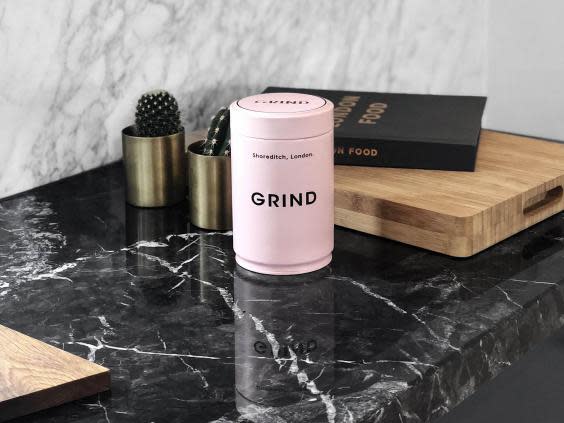
If you’ve been to any of Grind’s London café-restaurant-cum-bars you’ll recognise the House Blend coffee as its go-to flat white or latte blend. Grind works with farmers across the globe, paying significantly more than the Fairtrade price to ensure quality can be maintained alongside being environmentally responsible and sustainable by investing in projects to improve the communities they rely on for their beans.
Grind produces two coffee varieties, the house blend and the black blend, though other than being 100 per cent arabica, Grind does not give more information on the beans’ provenance, but says it works with a team of boutique importers to keep a consistent overall flavour profile, season to season. The house blend is roasted, ground and tasted daily at its converted Shoreditch warehouse ready for you to buy in its Instagrammable millennial pink tins. We found the house blend to be straightforward and crowd pleasing with a light, bright roast but perhaps a lack of interest for serious coffee buffs.
Union, Bobolink Brazil coffee: £6.25 for 200g, Union
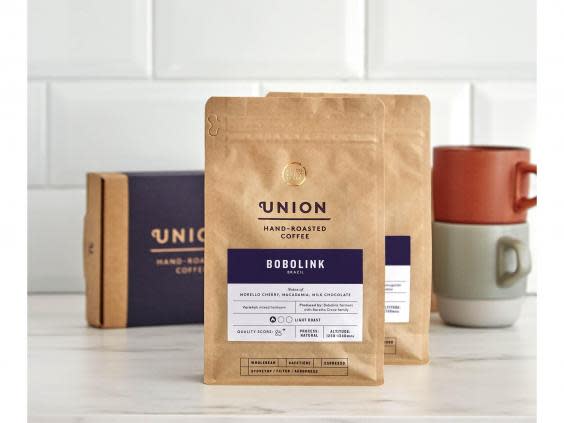
Union began roasting in 2001 after its founders visited San Francisco and became set on bringing the same buzzing artisanal coffee scene to the UK. They gave up their day jobs as scientists and set about redressing some of the devastation faced by coffee farmers after the world commodity price dropped by sourcing coffee using a newly direct trading approach and paying a premium price allowing farmers to invest in their land and work. Today, Union works across 14 countries to source impeccable small batches of coffee – blends, single origins or unique microlots – to be roasted in its east London roastery by roastmasters keen to show off each bean to its best ability.
We tested the Bobolink Brazil which is reported to be a favourite at the roastery. Union says it’s “beautifully smooth with a rich aftertaste that lasts and lasts” and we’re minded to agree; it’s exceptionally creamy with a noticeably rounded mouthfeel thanks to a macadamia note. Some ever-popular milk chocolate hues thrown into the mix, plus its lightness mean that most people would enjoy this coffee.
Union should be commended for its environmental efforts too: coffee chaff (husks) is recycled into bedding for barista-milk producing cattle, coffee grounds become bio-fuel and it has invested in a single burner roaster which cuts energy consumption by 80 per cent and is smoke-free. Impressive stuff.
Revolver World, Honduras fairtrade and organic coffee: £3.99 for 200g, Revolver World
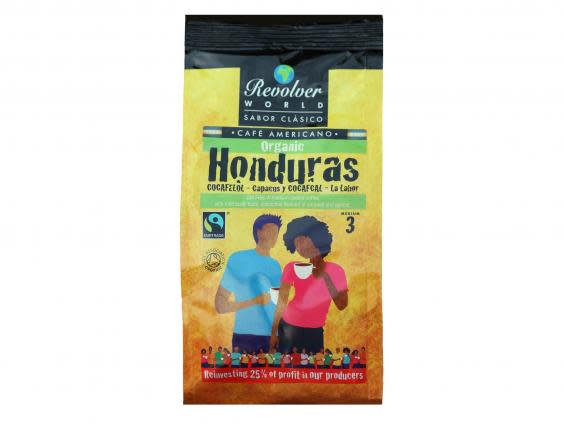
This multinational co‐operative aims to maximise opportunities and income for producers and members alongside campaigning on human rights issues and supporting NGO’s. A quarter of profits are reinvested into producer communities, such as the two Honduran cooperatives who produce this coffee from its base near to the country’s highest mountain, Cerro Las Minas.
Both cooperatives are committed to growing sustainable and organic coffee in a way that benefits their communities and families – one has recently built a library for the farming neighbourhood and a sports centre and playing fields are in progress.
Revolver World don’t do coffee blends, preferring to showcase cooperatives’ efforts through individual country instead: all are 100 per cent arabica and organic, you just need to choose whether you’d like your coffee from Costa Rica, Cuba, Ethopia, Peru, the list goes on. We really liked this Honduras coffee, which is billed as a medium bodied number with mild acidity and distinctive caramel and apricot flavours. This is a wake you up coffee if we ever saw one; we found an overriding and delicious taste of dark caramel finished with French apricot tart. This coffee is one of the only ones to deliver a buzz after one cup, if you like that kind of thing. We do.
Eat Your Hat, zesty monkey ground coffee: £5.90 for 200g, Eat Your Hat
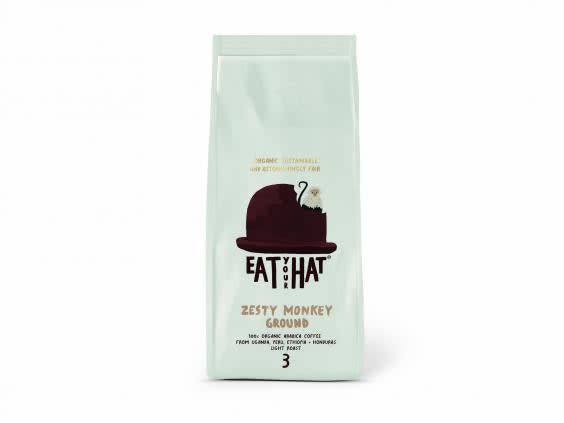
This brand is all about sustainably-grown, organic and ethically traded chocolate and coffee, with a big emphasis on soil health and caring for the environment; almost everything it makes is recyclable and compostable. The coffee beans are sourced from smallholder farmers across the world, are all pesticide, fertiliser and toxin-free with the aim of making the purest cup of coffee possible.
Eat Your Hat currently has five coffee varieties available, all of which are graded 80 points or above on the standard 100-point scale. We plumped for the zesty monkey ground above others, sold by its claims of caramel, citrus and apricot aromas and found it was dangerously easy-drinking. We liked the subtle lemon and lime notes with a silky caramel backdrop just before it turns to burnt toffee.
Paddy & Scott’s, jerry can coffee: £5.49 for 227g, Paddy & Scott’s
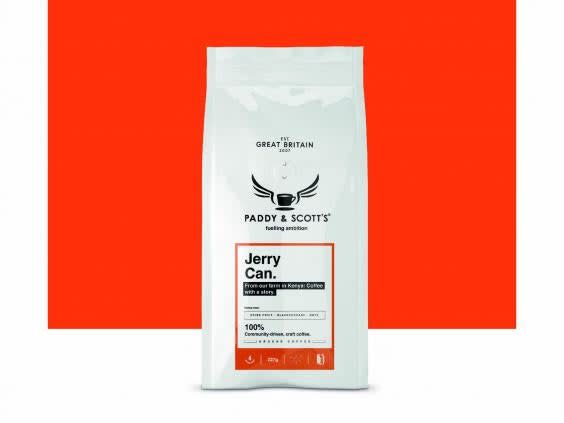
The jerry can is the brand’s flagship coffee, so-called because Kenyan children in the coffee communities carried jerry cans of water along a busy road to school. Paddy & Scott's work in farming regions funded a fresh-water pipeline allowing children to swap the jerry cans for the classroom and today has its own coffee farm where it works with a local Meru family to cut out any middle-men and give more profit back to the coffee-growing community.
The Meru Farm coffee arrives at the Suffolk roastery for a series of expert roasts and taste tests before being delivered fresh to homes, businesses and starry events. On the nose, this coffee smells like some kind of deeply fruited cake – almost Christmassy. There’s a faint smokiness but the medium roast means that some dark fruit elements can still be found flavour-wise as a good compromise.
Roasting Plant, Ethiopian reserve coffee: £12.50 for 250g, Roasting Plant
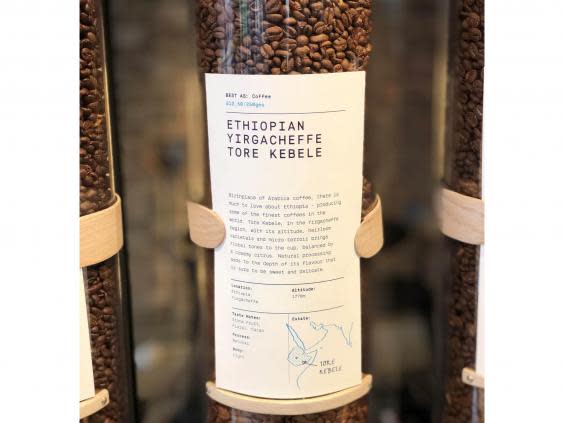
Bringing the coffee culture of NYC over to Borough Market and beyond, Roasting Plant has a high tech set-up, using its “javabot” machine which roasts and grinds beans at calculated conditions, tailored to each varietal. Beans are hand sourced from small farms across the coffee communities – which are then delivered to your door. There’s a constantly changing seasonal array of beans, but we settled on a stunning Ethiopian reserve blend. Known as the birthplace of arabica, Ethiopia’s coffee is diverse and until recently Ethiopian smallholders were required to be sold through the Ethiopian Commodity Exchange which meant quality and traceability were lost.
Reform in 2017 meant farmers could separate their top lots, improving quality and achieving higher prices for their goods. This particular variety hails from the Yirgacheffe forests which is characterised by a floral, creamy coffee with clear acidity. Roasting Plant says this bean has notes of stone fruit, with cacao and floral notes and a smooth mouthfeel; we loved the unique fruity floral mix and noticed a healthy whack of chocolate and a sweet light citrus too.
Coaltown Coffee, pit prop No. 1 signature blend: £7.50 for 227g, Coaltown Coffee
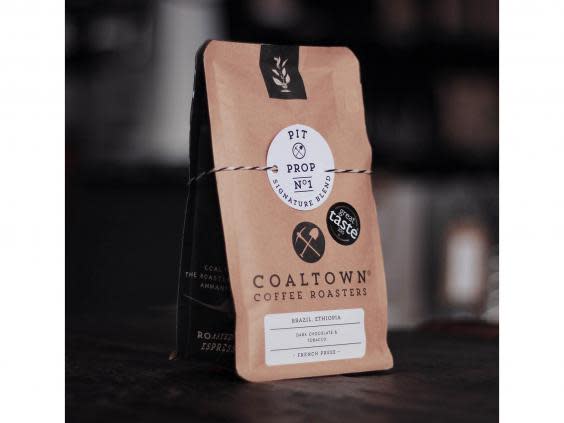
Coaltown Coffee was born from a desire to restore a former Welsh mining town to its industrial glory after the last colliery closed in 2003, causing extensive unemployment. Since then a roastery and academy was was set up to help bring locals into coffee culture and possibly a new career path.
Coaltown exclusively deals with specialty coffee and focus on sustainable and transparent trade with small farms from across the coffee growing regions of the world. The resulting crops are hand-roasted in small batches using timing and temperature to drawing out personality and complexity from each coffee. Coaltown offers a range of interesting blends, single origins and subscription based packages, but we were drawn to the signature coffee, pit prop no1. It’s an espresso blend of Nicaraguan, Guatemalan and Sumatran arabica that has already bagged a Great Taste Award thanks to its deep, dark chocolate orange flavours.
Coaltown says this is for coffee fans who enjoy new flavours and though it wasn’t the most out-there of the coffees we tried in this test, we noted how luxurious it felt. The profile is darkly sweet, smokey and savoury making it a persuasive double shot, but we particularly enjoyed the tobacco note which is prominent with a satisfying tang.
Common Coffee, birght: £9 for 250g, Common Coffee
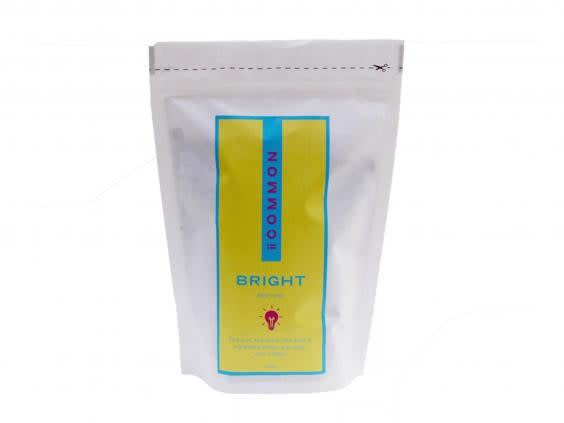
Common Coffee was started by a group of festival-loving entrepreneurs with a penchant for coffee. After travelling the country serving up coffee and nitro-cocktails at events, Common began its own roastery out of Edinburgh with the expertise of a self-taught coffee roaster, taster and profiler. It now produces four coffee varieties, sold by their overriding profile: strong, sweet, bright and complex.
We really like the bright roast, which is made using a washed red bourbon arabica from the Kayanza region of Burundi and grown by a smallholder who sun-dries the coffee on raised African beds. Common says it tastes like cherry, mandarin and honey and we do get the cherry notes along with a definite citrus feel, though it feels more like grapefruit to us – plus a nice hum of something floral and heady. It’s an excellent coffee and one we’d very much like to drink again. It’s also worth knowing that Common’s packaging is omnidegrabable, so bags and labels are fully compostable and biodegradable in any environment – water, compost or landfill.
The verdict: Independent coffee brands
Dear Green’s deliciously aromatic Kenyan number has a seriously unique profile and a a tropical personality that coffee nerds will enjoy. For an every day cup, we’d turn to Cafédirect’s D.R. Congo which is handily in Waitrose, but for an enlivening espresso we’ll take Pact’s house coffee.
Read more
10 best ethical homeware products to make make your space eco-friendly
14 best meat boxes from ethical farms to help you eat better food


